The Microbiome Therapeutics Market is estimated to be valued at USD 0.3 billion in 2025 and is projected to reach USD 4.2 billion by 2035, registering a compound annual growth rate (CAGR) of 31.1% over the forecast period.
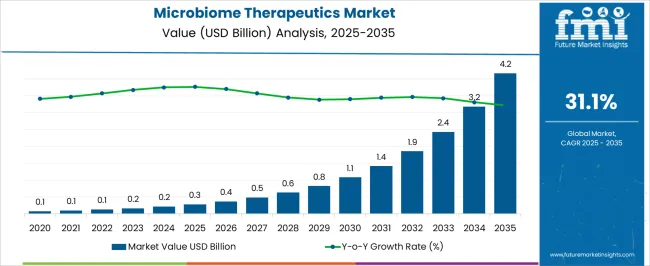
| Metric | Value |
|---|---|
| Microbiome Therapeutics Market Estimated Value in (2025 E) | USD 0.3 billion |
| Microbiome Therapeutics Market Forecast Value in (2035 F) | USD 4.2 billion |
| Forecast CAGR (2025 to 2035) | 31.1% |
The Microbiome Therapeutics market is experiencing robust growth, driven by increasing awareness of the role of the human microbiome in maintaining overall health and preventing chronic diseases. Rising prevalence of lifestyle disorders, gastrointestinal conditions, and metabolic syndromes has amplified the need for targeted microbiome therapies. Growing research and development investments, alongside advances in genomics and bioinformatics, are enabling the development of precision-based therapeutic products.
Probiotics, prebiotics, and synbiotics are being widely adopted across preventive healthcare and clinical treatments, supported by consumer demand for natural and safe alternatives to conventional pharmaceuticals. Pharmaceutical companies are actively collaborating with biotechnology firms and research institutions to accelerate product innovation and clinical trials. Additionally, regulatory support for microbiome-based solutions in developed markets is creating opportunities for product commercialization.
The increasing adoption of personalized medicine and dietary interventions is reinforcing the expansion of the market With a strong pipeline of clinical-stage products and growing acceptance of microbiome therapeutics for disease management, the market is positioned for sustained growth across healthcare, wellness, and pharmaceutical ecosystems.
The microbiome therapeutics market is segmented by product type, distribution channel, application area, and geographic regions. By product type, microbiome therapeutics market is divided into Probiotics, Prebiotics, and Synbiotics. In terms of distribution channel, microbiome therapeutics market is classified into Hospital Pharmacies, Drug Stores, Retail Pharmacies, Super And Hypermarkets, and E-Commerce Stores. Based on application area, microbiome therapeutics market is segmented into Digestive Health, Respiratory Health, Oral Health, Immune Conditions, and Others. Regionally, the microbiome therapeutics industry is classified into North America, Latin America, Western Europe, Eastern Europe, Balkan & Baltic Countries, Russia & Belarus, Central Asia, East Asia, South Asia & Pacific, and the Middle East & Africa.
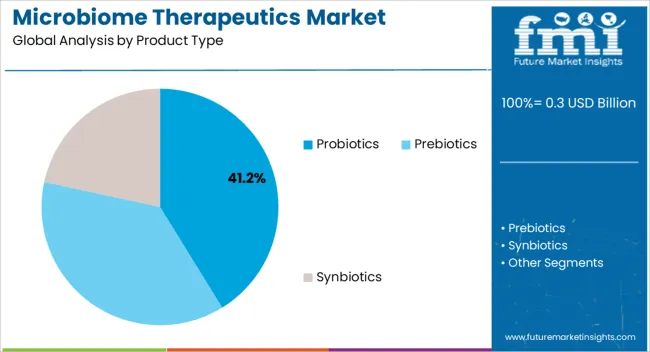
The probiotics product type segment is projected to hold 41.2% of the market revenue share in 2025, establishing it as the leading category. Growth is being supported by the widespread use of probiotics in addressing digestive disorders, enhancing immune response, and promoting general well-being. Probiotics are increasingly incorporated into therapeutic regimens due to their proven efficacy in restoring gut microbiota balance, which is critical in managing gastrointestinal conditions and reducing infection risks.
Consumer preference for natural, non-invasive health solutions is further driving adoption across dietary supplements, functional foods, and clinical therapies. Continuous innovation in strain development and formulation technologies has expanded product availability, making probiotics more effective and accessible. Moreover, rising scientific evidence supporting their role in preventing chronic diseases and improving treatment outcomes has reinforced market confidence.
Strong distribution networks and integration with healthcare provider recommendations are also strengthening market growth As preventive healthcare gains traction globally, probiotics are expected to maintain their leadership, supported by clinical validation and consumer trust.
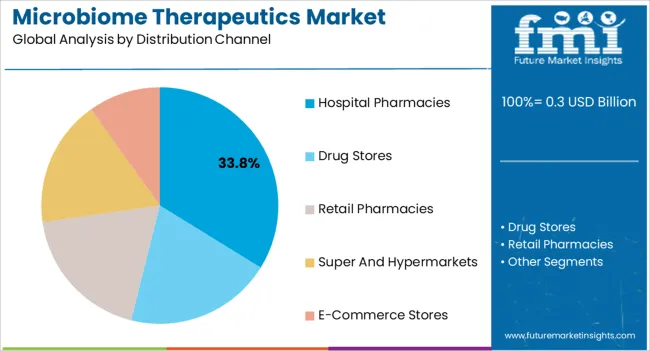
The hospital pharmacies distribution channel segment is expected to account for 33.8% of the market revenue share in 2025, positioning it as the leading distribution channel. Growth is being driven by the increasing reliance on hospital pharmacies as primary points of access for microbiome-based therapies prescribed by healthcare professionals. Hospital pharmacies ensure regulated dispensing of microbiome therapeutics, maintaining quality, dosage accuracy, and adherence to safety standards.
Patients with chronic conditions such as gastrointestinal disorders, metabolic syndromes, and immune-related illnesses are more likely to receive probiotic-based prescriptions through hospital pharmacies, strengthening the segment’s dominance. Additionally, integration of microbiome therapies into clinical treatment pathways is enhancing trust among physicians and patients, driving higher uptake. Hospital pharmacies also provide direct counseling and monitoring support, improving patient compliance and therapeutic outcomes.
The strong regulatory oversight associated with hospital-based distribution further boosts reliability and adoption With rising hospital admissions for digestive and metabolic disorders, the segment is projected to remain the preferred distribution channel for microbiome therapeutics.
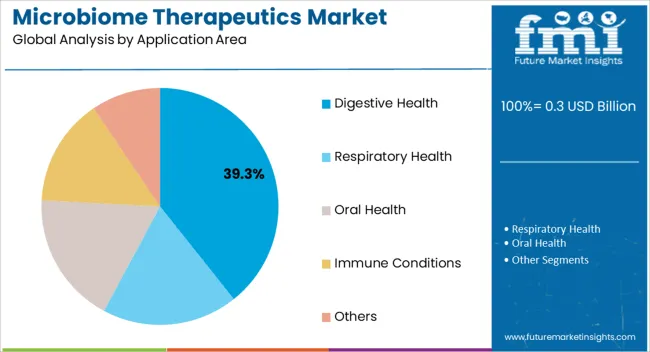
The digestive health application area segment is anticipated to hold 39.3% of the market revenue share in 2025, making it the largest application category. Growth in this segment is being fueled by the rising prevalence of gastrointestinal conditions such as irritable bowel syndrome, inflammatory bowel disease, and chronic constipation. Microbiome therapeutics, particularly probiotics, are increasingly used to restore microbial balance, improve digestion, and enhance nutrient absorption.
The global shift toward preventive healthcare has strengthened consumer demand for digestive health solutions, driving adoption across clinical, over-the-counter, and dietary supplement markets. Clinical studies highlighting the efficacy of microbiome-based interventions in reducing digestive discomfort and improving long-term gut health are reinforcing trust and expanding applications. Growing awareness about the gut-brain axis and its influence on overall wellness is further supporting market growth.
Additionally, integration of microbiome therapies into functional food and beverage formulations is widening consumer reach As digestive health remains a primary focus of preventive medicine, this segment is expected to maintain leadership through increasing clinical adoption and consumer acceptance.
Microbiome refers to the collection or community of microbes. Microbial community that presented in our body has major impact on the body functions from digestion to immune conditions. Millions of microbes are present in our digestive tract, oral cavity, respiratory mucosa, skin and other parts of the body.
In recent years, research on microbiome increased over the years to know benefits associated with microbes on the host. In microbiome therapeutics probiotics, prebiotics and synbiotics play a vital role in diagnosis, prevention, and treatment of various disease conditions.
Probiotics are microorganisms such as bacteria, yeasts that provide health benefits when they consumed. Prebiotics are non-digestible carbohydrate that helps in growth of microbes that are present in the body.
The combination of probiotics and prebiotics called as Synbiotics. However, till date, there was no microbiome related product in the market that was approved by USA FDA to treat any specific indication. The most beneficial factor for microbiome therapeutics is they didn’t cause any side effects unlike the drug molecules as they already reside in the body.
Hence, they are gaining traction from many small and big companies to explore its benefits on various disease indications like prevention of oral biofilm, Crohn's disease, Irritable bowel syndrome conditions that don’t have any proper treatment.
Vedanta Biosciences, a startup working on Clostridium strains (VE-202) to treat IBD and Crohn’s disease conditions. In January 2025, Johnson and Johnson signed the license agreement with Vedanta Biosciences to acquire rights for the investigational drug to treat IBD conditions.
Synologic involved in the development of medicines from microbiome platform collaborated with AbbVie to develop the drug for inflammatory bowel disease.
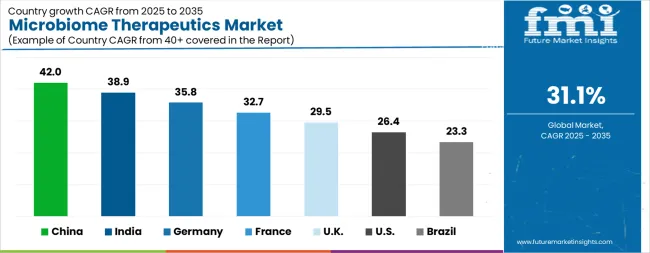
| Country | CAGR |
|---|---|
| China | 42.0% |
| India | 38.9% |
| Germany | 35.8% |
| France | 32.7% |
| UK | 29.5% |
| USA | 26.4% |
| Brazil | 23.3% |
The Microbiome Therapeutics Market is expected to register a CAGR of 31.1% during the forecast period, exhibiting varied country level momentum. China leads with the highest CAGR of 42.0%, followed by India at 38.9%. Developed markets such as Germany, France, and the UK continue to expand steadily, while the USA is likely to grow at consistent rates. Brazil posts the lowest CAGR at 23.3%, yet still underscores a broadly positive trajectory for the global Microbiome Therapeutics Market. In 2024, Germany held a dominant revenue in the Western Europe market and is expected to grow with a CAGR of 35.8%. The USA Microbiome Therapeutics Market is estimated to be valued at USD 96.6 million in 2025 and is anticipated to reach a valuation of USD 1.0 billion by 2035. Sales are projected to rise at a CAGR of 26.4% over the forecast period between 2025 and 2035. While Japan and South Korea markets are estimated to be valued at USD 14.9 million and USD 8.4 million respectively in 2025.
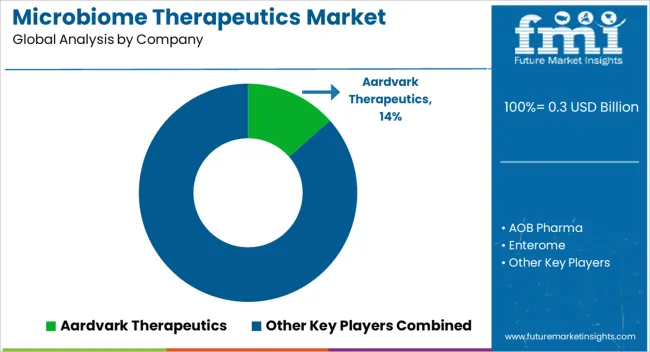
| Item | Value |
|---|---|
| Quantitative Units | USD 0.3 Billion |
| Product Type | Probiotics, Prebiotics, and Synbiotics |
| Distribution Channel | Hospital Pharmacies, Drug Stores, Retail Pharmacies, Super And Hypermarkets, and E-Commerce Stores |
| Application Area | Digestive Health, Respiratory Health, Oral Health, Immune Conditions, and Others |
| Regions Covered | North America, Europe, Asia-Pacific, Latin America, Middle East & Africa |
| Country Covered | United States, Canada, Germany, France, United Kingdom, China, Japan, India, Brazil, South Africa |
| Key Companies Profiled | Aardvark Therapeutics, AOB Pharma, Enterome, Ferring pharmaceuticals, Finch, Inlife, Intralytix, LNC Therapeutics, MaaT Pharma, OPENBIOME, Seres Therapeutics, and VEDANATA Biosciences |
The global microbiome therapeutics market is estimated to be valued at USD 0.3 billion in 2025.
The market size for the microbiome therapeutics market is projected to reach USD 4.2 billion by 2035.
The microbiome therapeutics market is expected to grow at a 31.1% CAGR between 2025 and 2035.
The key product types in microbiome therapeutics market are probiotics, prebiotics and synbiotics.
In terms of distribution channel, hospital pharmacies segment to command 33.8% share in the microbiome therapeutics market in 2025.






Our Research Products

The "Full Research Suite" delivers actionable market intel, deep dives on markets or technologies, so clients act faster, cut risk, and unlock growth.

The Leaderboard benchmarks and ranks top vendors, classifying them as Established Leaders, Leading Challengers, or Disruptors & Challengers.

Locates where complements amplify value and substitutes erode it, forecasting net impact by horizon

We deliver granular, decision-grade intel: market sizing, 5-year forecasts, pricing, adoption, usage, revenue, and operational KPIs—plus competitor tracking, regulation, and value chains—across 60 countries broadly.

Spot the shifts before they hit your P&L. We track inflection points, adoption curves, pricing moves, and ecosystem plays to show where demand is heading, why it is changing, and what to do next across high-growth markets and disruptive tech

Real-time reads of user behavior. We track shifting priorities, perceptions of today’s and next-gen services, and provider experience, then pace how fast tech moves from trial to adoption, blending buyer, consumer, and channel inputs with social signals (#WhySwitch, #UX).

Partner with our analyst team to build a custom report designed around your business priorities. From analysing market trends to assessing competitors or crafting bespoke datasets, we tailor insights to your needs.
Supplier Intelligence
Discovery & Profiling
Capacity & Footprint
Performance & Risk
Compliance & Governance
Commercial Readiness
Who Supplies Whom
Scorecards & Shortlists
Playbooks & Docs
Category Intelligence
Definition & Scope
Demand & Use Cases
Cost Drivers
Market Structure
Supply Chain Map
Trade & Policy
Operating Norms
Deliverables
Buyer Intelligence
Account Basics
Spend & Scope
Procurement Model
Vendor Requirements
Terms & Policies
Entry Strategy
Pain Points & Triggers
Outputs
Pricing Analysis
Benchmarks
Trends
Should-Cost
Indexation
Landed Cost
Commercial Terms
Deliverables
Brand Analysis
Positioning & Value Prop
Share & Presence
Customer Evidence
Go-to-Market
Digital & Reputation
Compliance & Trust
KPIs & Gaps
Outputs
Full Research Suite comprises of:
Market outlook & trends analysis
Interviews & case studies
Strategic recommendations
Vendor profiles & capabilities analysis
5-year forecasts
8 regions and 60+ country-level data splits
Market segment data splits
12 months of continuous data updates
DELIVERED AS:
PDF EXCEL ONLINE
Microbiome Fiber Supplement Market Size and Share Forecast Outlook 2025 to 2035
Biotherapeutics Virus Removal Filters Market Trends – Growth & Forecast 2025 to 2035
COPD Therapeutics Market Report – Growth, Demand & Industry Forecast 2023-2033
Digital Therapeutics and Wellness Market Size and Share Forecast Outlook 2025 to 2035
Digital Therapeutics Market Size and Share Forecast Outlook 2025 to 2035
Peptide Therapeutics Market Analysis - Growth & Forecast 2024 to 2034
Advanced Therapeutics Pharmaceutical Outsourcing Market Size and Share Forecast Outlook 2025 to 2035
Glaucoma Therapeutics Market Size and Share Forecast Outlook 2025 to 2035
Leukemia Therapeutics Treatment Market Analysis - Growth & Forecast 2025 to 2035
The Canine Flu Therapeutics Market is segmented by product, and end user from 2025 to 2035
Stuttering Therapeutics Market Trends, Analysis & Forecast by Treatment, Type, End-Use and Region through 2035
Pet Cancer Therapeutics Market Insights - Growth & Forecast 2024 to 2034
Candidiasis Therapeutics Market Size and Share Forecast Outlook 2025 to 2035
Lung Cancer Therapeutics Market Analysis – Size, Share, and Forecast Outlook 2025 to 2035
Heart Block Therapeutics Market Size and Share Forecast Outlook 2025 to 2035
Aquaculture Therapeutics Market Size and Share Forecast Outlook 2025 to 2035
Fucosidosis Therapeutics Market - Growth & Innovations 2025 to 2035
Market Leaders & Share in Alzheimer’s Therapeutics
Alzheimer’s Therapeutics Market Analysis by Disease Class into Cholinesterase Inhibitors, NMDA Receptor Antagonists and Combinations Through 2035.
Sarcoidosis Therapeutics Market

Thank you!
You will receive an email from our Business Development Manager. Please be sure to check your SPAM/JUNK folder too.
Chat With
MaRIA